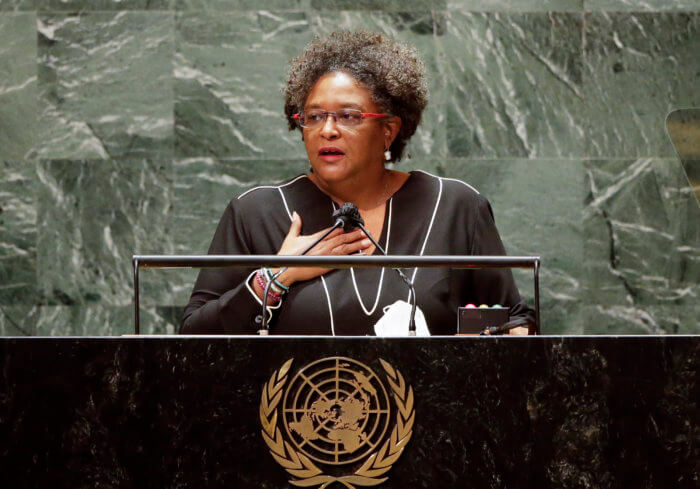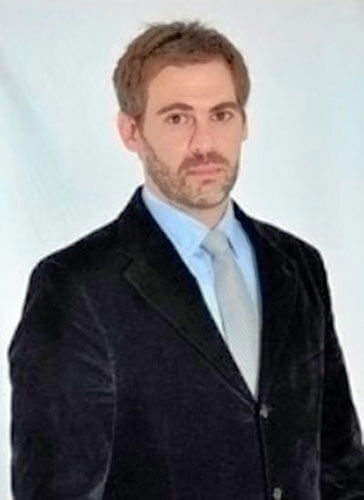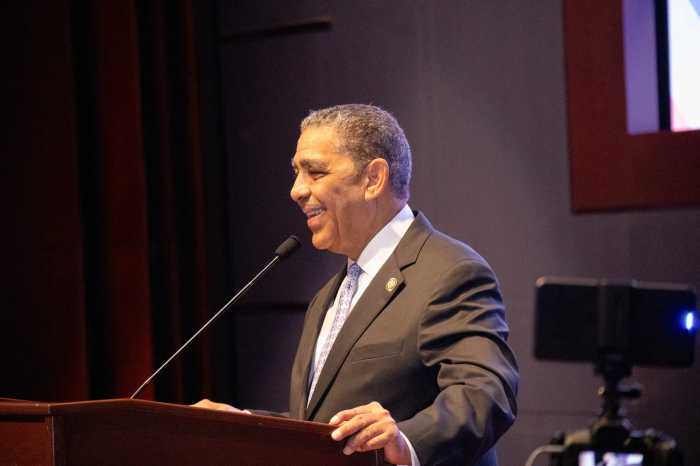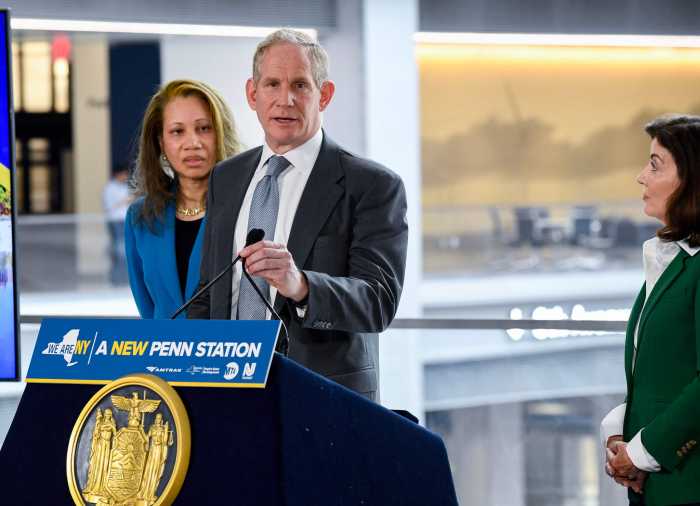Much has been, and remains, on the minds of Caribbean Community (CARICOM) leaders, as they wrapped up on Saturday their debate during the 77th Session of the United Nations General Assembly.
Major issues, such as development finance, multilateralism, climate change and Russia’s invasion of Ukraine dominated this year’s Debate.
Jamaica Prime Minister Andrew Holness told the General Assembly that a “comprehensive and targeted approach” to accessing development finance for Small Island Developing States (SIDS) and some middle-income countries is need, given their particular vulnerability to climate shocks and external economic shocks, “which have an oversized impact relative to their national budgets, and often crippling impact on their infrastructure.”
“For SIDS to survive economic shocks and recover lost and damaged infrastructure, they are forced to borrow, only to be confronted again in a few years with another round of natural disasters, which could wipe out significant infrastructure and force us to add to our already high debt,” he said.
“As I speak, I am monitoring a tropical system that is threatening in the Caribbean,” he added. “We fully support the work of the High-Level Panel developing the Multi-Dimensional Vulnerability Index.
“We eagerly anticipate an era of truly equitable access to concessional financing and other funding support, which will enable us to invest in the resilient infrastructure and create fiscal buffers so that we can withstand and recover quickly from the next economic, health or climate shock with little borrowing,” the Jamaican leader continued. “Without the acknowledgment of vulnerability as a basis for access to finance, SIDS will continue to struggle and will be unable to achieve the SDGs (UN’s Sustainable Development Goals).”
However, the prime minister said SIDS, like Jamaica, are always mindful that, despite best efforts to improve fiscal management and debt sustainability, “a single climate generated event could wipe out 100 percent of our economy in a few hours,” warning that Climate Change is “an immediate existential threat for SIDS, like Jamaica, the Caribbean and the Pacific.”
Amid what he described as an “increasingly sense of despair” globally, St. Vincent and the Grenadines Prime Minister Dr. Ralph E. Gonsalves said it is time to “embrace fresh hope.”
“This existential longing that touches the human spirit and sou, goes beyond a mere amelioration of our current travails,” the Vincentian leader said. “It demands correctives or reformations of a structural or fundamental kind, and fresh thinking. Without fresh hope, a desecration of our future awaits us.
“Amidst all this competitive jostling for power and vainglory, confusion reigns and the overwhelmingly majority of the world’s population suffers,” Dr. Gonsalves said. “It is instructive to note that the contemporary circumstances of the global political economy and society have prompted the powerful and some ‘wannabe’ powerful countries to proclaim the necessity to construct a ‘New World Order’, each with its own peculiar agenda.
“But from the global periphery, which encompasses most of humanity, I ask the relevant and haunting questions: what’s new? which world? and who gives the orders? The future of humanity depends on satisfactory answers to these queries,” he added.
In this maelstrom, Gonsalves said the center cannot hold, stating that “things are falling apart.”
“Yet, we must not wring our hands, metaphorically, in learned helplessness,” he said. “The principals are certainly not innocent of the extant condition, and there are bundles of credible ideas in our multilateral system to fashion possible lasting solutions in pursuit of peace, prosperity, sustainable development, and security for humanity as a whole. So, where do we go from here?”
Central to a credible, equitable path forward for humanity and civilized life, living and production, the prime minister said is the “requisite of quality global leadership.”
The Bahamas Prime Minister Philip Davis says that of all the risks his country faces, none requires more urgent action than the climate crisis.
Prime Minister Davis said that, in 2019, Hurricane Dorian, a Category 5 storm that nearly destroyed two of the Bahamas’ main islands, t wiped out 30 percent of the Bahamas national economic activity.
“The impact on our economy, on our infrastructure, and on our people is still very much present,” he said. “The scientific consensus is, that as ocean temperatures rise, we can expect hurricanes of greater intensity to arrive with increased frequency.
“Small island nations like mine did not create the emissions that are warming the earth, but, nonetheless, we are on the frontline of climate catastrophe,” Davis added. “But no one country – large or small – acting alone, can stop climate change. The first UN climate conference took place in 1992. Yet, despite decades of conferences and meetings featuring warnings from scientists and experts, one-sixth of all the carbon emissions ever – some 407 billion tons — occurred between 2010 and 2020.
“I have frequently spoken, as have so many others, about the need for action in terms of climate justice, and fairness,” the Bahamian prime minister continued. “Why should small island nations like mine – we who have contributed so little to the climate crisis – experience the biggest burdens and risks of a changing climate? The argument might be straightforward – but it has not been effective.
“For a long time, decision-makers in both the public and private sectors believed that climate action must come at the expense of economic growth. But now, many are beginning to understand that climate inaction is the most expensive option of all,” Davis said. “Taking action is not just in the interests of those of us who are particularly vulnerable. It is in the interest of every country. And it is this ‘enlightened self-interest’ that should motivate action.”
New Grenada Prime Minister Dickon Mitchell urged the international community to escalate climate change to the same level of urgency as the COVID-19 pandemic.
In his maiden address to the United Nations General Assembly Debate Mitchell said that the COVID‑19 pandemic has taught the international community the value of cooperation, timely exchange of information and sharing of resources.
“Therefore, it is imperative that the matter of climate change be escalated to the same level of urgency,” he said. “The world must now accept that the solutions to these problems cannot be found be found in this grand Hall but rather in young people, who stand to lose the most from the inaction of the world’s current leaders.”
The Grenadian leader said the small island States of the Caribbean are already experiencing significant effects of climate change.
“We watch and wait, with bated breath and a silent prayer, in the hope that this year it will not be ‘our turn’”, he said, reiterating his call for the scaling up of climate finance for adaptation and the removal of challenges that developing states face to access climate financing.
Stating that the United Nations finds itself at a crossroads in reckoning with history’s judgment, St. Kitts and Nevis Prime Minister Dr. Terrance Drew urged that the 77th General Assembly not be used merely for political posturing but for “resolute recommitment to multilateral cooperation.”
“For Small Island Developing States, and, indeed, vulnerable peoples everywhere, there can be no international security without climate security,” said Dr. Drew in his maiden UN General Assembly address. “This requires collective fidelity to multilateral action for our very survival.
“I am ready, and I am sure that all of us are eager, to build a better world through multilateral action, and uphold, with all our will and might, this sacred tenet of the United Nations,” added the prime minister during the 77th Session of the UN General Assembly Debate.
“Even as geopolitics and great power competition is exacerbating conflict and the climate catastrophe, we must face the hard truth that only through multilateralism will we force the global trajectory toward global peace, prosperity and sustainability,” he continued.
The prime minister said that Small Island Developing States and other developing nations experience a reality plagued by the continuous existential threat of climate change.
“With the passage of every hurricane, every outbreak of war and every global food shortage, we all remain at risk of tipping the balance that we have striven to create over the years,” he said. “Thus, it is not enough for us to articulate this grim reality year after year.
“We must now look to act in ways that provide tailored responses to these vulnerabilities, so as to foster true resilience and risk mitigation,” Dr. Drew added. “Therefore, I humbly urge countries to honor the financial commitments made following the COP26 to double contributions to adaptation financing by 2025. A delayed response to these commitments would further imperil our developing nations.”
Belize Prime Minister John A. Briceño said that global economic realities exacerbate “an already acute social situation” in the CARICOM member-country.
“The post pandemic recovery we anticipated is delayed,” he said. “And the chorus of promises and commitments to pivot toward building back better, to getting the recovery right have yielded little. Instead, global action and inaction have only resulted in deepening the many crises that we are facing.
“Global temperatures have already increased by 1.2 degrees Celsius above pre- industrial levels; greenhouse gas emissions reached record highs in 2021 and continue to rise this year; fossil fuels are still dominant; while renewables account for an abysmal 15 percent of global energy sources,” Briceño continued.
He said the current energy crisis in Europe has triggered more fossil fuels as a panacea, “rather than a doubling down on energy transition.”
In addition, the Belizean leader said biodiversity is declining at a faster rate than ever before, “with profound and unknown consequences for our environment, health, productivity and wellbeing.
“These realities heighten climate risk, especially for vulnerable states,” he said, stating that Belize is ranked 8th out of 183 on the Global Climate Risk Index.
“We are but one hurricane away from catastrophe,” he warned. “Yet, financing needed for climate adaptation remains woefully inadequate; only about a quarter of all climate finance goes to adaptation.”
St. Lucia Prime Minister Philip J. Pierre said that, “despite our small size, despite our deliberate desire to be a source of peace and friendship to all, despite our democratic traditions, and despite our earnest efforts to make the development of our people our primary objective, we find ourselves in a world stacked against us and frustrating our development at every turn.
“Our diversification into financial services is also threatened by an uneven regime of negative regulations,” he added. “And, overarching all of this, are the continued challenges of climate change with its fierce occurrences of floods, droughts and hurricanes, adding yet more uncertainty to our economic projections and aspirations.
“The quantum of financing for climate justice, needed by Developing Countries and agreed upon by the Developed countries, has not materialized,” Pierre continued. “Other issues of the Paris rule book are still to be implemented.
“The Multilateral development financial institutions have yet to change their systems to make it easier for developing countries to access the financing required to adapt to climate change and build climate resilient economies,” he said.
Gaston Browne, Prime Minister of Antigua and Barbuda, said the world is “now gripped in a fearful atmosphere of economic and financial instability, and the worry of expanded warfare.
“Every nation, without exception, is confronting escalating inflation, food shortages, high prices, and increasing debt,” he said. “But the worst effects are being suffered by the poor and powerless, the small and exposed.
“There should be no doubt, in this Assembly, that trust in the Security Council has been diminished by the actions taken within its membership,” the prime minister added. “Many small and defenseless nations now feel gravely unprotected by the weakening of the international legal order, which was our first, last and only defense against aggression.
“Even worse, our development prospects and our hard work to rise up from poverty, are being retarded by the high prices and severe disruptions that began with the COVID-19 pandemic, and that are being exacerbated by the war on Ukraine,” he continued. “Therefore, we call on the Permanent Members of the Security Council to recommit themselves to the role, which they assumed and pledged to safeguard.”
Guyana President Dr. Mohamed Irfaan Ali noted that the international community is facing a series of interlocking challenges – a global pandemic, climate challenges, energy and food crises, and inter-State conflicts.
“The global food security problem has disproportionately affected us,” he said. “Further, since the onset of the Russia-Ukraine war, global food prices increased sharply reaching an all-time high in February 2022.
“In honoring our commitment to promote peace, stability, respect for territorial integrity and democracy, and the human rights of all, we must work collectively to prevent situations that can widen inequality and create social and economic havoc,” Dr. Ali added. “Now is the time for us to decide if a new approach is needed to guarantee food security, access to health care and quality education, and security from conflict and wars.”
Suriname President Chandrikapersad Santokhi said that, as leader of a small country, one of only three, carbon-negative countries in the world, “I appeal to you today to let us uphold our firm commitment to international principles and international law by all, when addressing the global challenges and threats.
“No country is immune, to the climate crisis,” he said. “Over the past months, Suriname, has been affected by excessive rainfall, resulting in floods in many parts of the country.
“Due to the inflow of salt water, fertile agricultural land, was adversely affected, causing economic loss, and impacting food security, and rural livelihoods,” he added. As we prepare in the short to medium term, we continue to lobby the international community, to recognize the urgent need, to help Caribbean Small Island and Low-lying Coastal Developing States to adapt, to the perils they face, as a result of global climate change.”
Dominica condemned Russia’s invasion of Ukraine “without reservation”, saying that the invasion of one country by another must always be condemned.
“The developments since 2014, which have led to the Russian invasion of Ukraine in 2021, are well known,” he said. “Nevertheless, we in Dominica are of the view that this invasion and the ensuing war could have been avoided.”
The president said Dominica holds firmly to the principle that international disputes should preferably be settled through negotiation and arbitration and not through war.
“We hold that might is not necessarily right,” he said. “Whatever argument may be put forward, the terrible toll being inflicted on the people of Ukraine in terms of loss of life and destruction of their towns and cities is unacceptable.
“The Commonwealth of Dominica, therefore, stands with the rest of the world in calling for an immediate cessation to the conflict, which continues to rage in Ukraine,” Savarin added.
Stating that, over the decades, Trinidad and Tobago has anchored its multilateral engagement on the founding purposes and principles of the United Nations, Foreign Affairs Minister Amery Browne called on the Russian Federation to immediately cease its invasion of Ukraine.
“We have nurtured these principles by maintaining a strong tradition of democratic governance, which respects constitutionally enshrined fundamental human rights and freedoms, and promotes strict adherence to the rule of law,” Browne said. “Trinidad and Tobago accordingly is bound by duty to uphold these principles unconditionally and to defend them, whenever there is evidence of breach.
“This is why Trinidad and Tobago cannot accept or ignore any unilateral attempt to violate the sovereignty and territorial integrity of any state,” he added. “The violation of Ukraine’s internationally agreed borders constitutes a flagrant violation of the UN Charter and of international law. It is a clear threat to international peace and security, and the only credible solution is to end this aggression immediately.
“Therefore, we call on the Russian Federation to immediately abandon its action and to resume negotiations with the Ukrainians in good faith to find a peaceful and durable resolution,” Browne continued.

Barbados Prime Minister Mia Amor Mottley warned that: “A Security Council that retains the power of veto in the hands of a few will still lead us to war.”
Therefore, she said the reform of the Council “must not simply be in its composition but also be in the removal of that veto.
“Moreover, the recognition of the Group of Seven (G7) and Group of 20 (G20) countries as the informal subcommittee of governance in the world, if it is to be fair, must include the people of Africa and African descent,” Prime Minister Mottley said. “How can a world have at its core a subcommittee that excludes more than 1.4-1.5 billion people of the world and expect it to reflect fairness and transparency in its decision-making?” she asked.
“Fairness will mean something only when it is reflected in the international community,” she added, stating that the international community must fight for reform, “so that citizens are not made victims of poverty as a result of the triple crisis of climate, pandemic and of the conflict that is leading to inflationary pressures.”
Voicing concern for the people of Haiti and the situation in the French-speaking Caribbean country, Mottley stressed that any attempt to increase fuel prices in any part of the world by 150 per cent would have been met with great consternation by populations with fixed income.
“If companies, multinational companies have contributed to the global public risk or benefit from the solutions from global public goods then they ought to contribute, through a small portion of their profits, funding the needs of countries whether on issue of climate resilience adaptation, biodiversity protection, public health.”
Haiti’s Foreign Affairs Minister, Jean Victor Geneus said that restoring public order and security are among the Haitian government’s top priorities.
Geneus said finding broad consensus for peaceful governance, holding democratic elections and socioeconomic development to improve people’s lives are also among the government’s priorities.
“Haiti is at a crossroads,” he said, adding that the people of the French-speaking Caribbean country are experiencing “a multidimensional crisis compounded by insecurity that endangers democracy and the rule of law.”
Noting the violence wrought by armed gangs, he said efforts are needed to improve police capacity and working conditions, referring to Council resolution 2645 (2022) in that regard.
The Foreign Affairs Minister called upon more governments to contribute to the basket fund used to financially aid the Haitian police, emphasizing that continued solidarity is needed.
While defending the right to freedom of expression and the right to protest, Geneus condemned looters and vandals that carried out attacks on churches and schools.
“Good governance goes hand in hand with the fight against corruption, smuggling and trafficking,” he said.
























